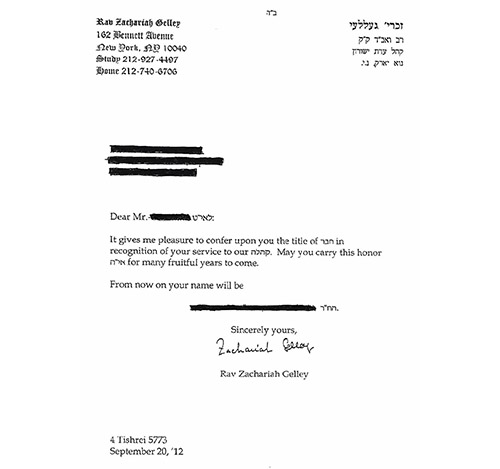
Part 1
Some time ago I wrote about a subject, “The Wimple,” that onlythose readers of German origin might have been familiar with. If brought up by parents of German origin, even then the word might lack any meaning. I hope that my writing was able to add some historical knowledge to many.
Now I am writing about another subject that also is unknown to most unless you are a history major or come from a certain German background. I say “certain,” since knowing about Chover is only guaranteed to those who have had direct or indirect contact with the “Breuer” community, namely Congregation Khal Adath Jeshurun in Washington Heights, or some of the other Ashkenazi communities such as IRG in Zurich, GGBH (Munks) in London, or German shuls in Petach Tikva, Tel Aviv, Haifa and Jerusalem.
What does the Chover title mean now? It is a title bestowed upon a man considered worthy by the rav of a community. It is bestowed upon members of the congregation for worthy activities on behalf of the shul and/or yeshiva and who in all respects lives up to the rav’s expectations. One requirement often is that the wife of the honored wears a sheitel.
My father was so honored by Rav Breuer in Washington Heights, and consequently the word Chover was added to his Hebrew name.
The method used to bestow the title was either by being called up to the Torah with the title or by having it added to a document such as a ketuva. There was frequently no ceremony and sometimes the individual found out about the honor at the same time as the community.
There are many theories of the origin of Chover. For example, an anonymous source writes that it “goes back to the Mishna, which uses it for those who kept ‘tahara’ and also for ‘chullin,’ in other words, to the routine of their lives. The title was used for centuries in Ashkenaz for someone special and can be found on tombstones, in letters and in the Rishonim. It was just an honorary title—no specific rules as to who would get the title or who would give it.”
Encyclopedia Judaica says that “… a member of the order for the observance of Levitical purity in daily intercourse was known as a ‘haver.’ However, in Amoraic
times, both in Palestine and Babylon, it could simply be a fellow student. Often honorific epithets were assigned to outstanding personalities, but these are descriptive
rather than titles proper.” And “Since the 15th century, among Ashkenazi Jewry the titles haver, morenuand rav appear in connection with the Ashkenazi semikhah.”
Reading other publications, one gets different opinions about Chover qualification,some maybe based on facts, others maybe on hearsay. For example, there is an unsigned comment in “Yeshiva News” on April 11th, 2018: “In Breuers there are generally three ways to get the title Chaver. Either by becoming 60 years old, or by being awarded Chosson Beraishis, or when getting married if your wife will cover her hair and you will stay learning for one year after marriage and the rov of the kehillah is mesader kiddushin, then you will be called Hachaver under the chuppa.”
There are also opinions that state that the rav notifies the individual that he will be getting the title. Some recipients have confirmed that they received a certificate. I never saw a certificate for my father and frankly do not remember the circumstances under which the title was given to him.
(To be continued next week
Norbert Strauss is a Teaneck resident and Englewood Hospital volunteer. He frequently speaks to groups to relay his family’s escape from Nazi Germany in 1941.











